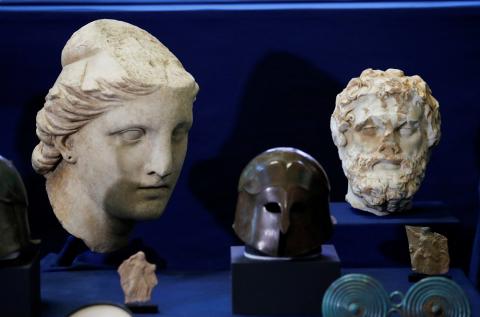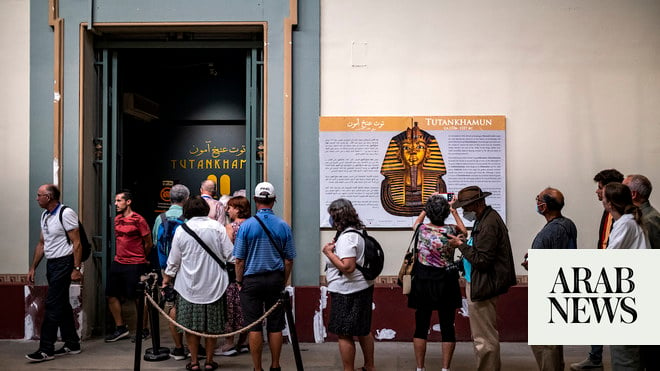
Auctioneers ‘withheld information from museum that bought clay tablet’
LONDON: An ancient Mesopotamian artifact at a museum in Washington, DC may have been illegally imported into the US after being stolen from Iraq at the end of the first Gulf War, leading to a lawsuit against one of the world’s biggest auction houses.
The artifact, a small clay cuneiform tablet thought to be around 3,500 years old, contains fragments of text from the “Epic of Gilgamesh,” one of the oldest works of literature in history.
It was confiscated by Homeland Security officers in September 2019 from the Museum of the Bible in Washington, which was co-founded by the president of US arts and crafts retailer Hobby Lobby, who bought the tablet for the museum.
On Monday, US prosecutors sought to formally take possession of it with a view to repatriating it to Iraq.
The museum said it is cooperating with the authorities and supports efforts to return the tablet.
Hobby Lobby filed a lawsuit against auction house Christie’s on Monday, through which the tablet was purchased, for withholding information about its origins.
The retailer bought the “Gilgamesh Dream Tablet” for $1.67 million in a private sale organized by Christie’s in 2014.
But in 2017, when the curator of the Museum of the Bible raised questions about the tablet’s origins, Christie’s withheld information that “would not withstand scrutiny” and engaged in “deceitful and fraudulent conduct,” according to the lawsuit.
Christie’s has denied wrongdoing, saying any and all illegality surrounding the tablet occurred prior to its involvement in 2014.
Federal prosecutors allege that the tablet was moved to the US illegally after being bought by an antiques dealer in London in 2003, before being sold on to a buyer in the US in 2007 for $50,000.
The US buyer then forged a letter claiming it had been purchased in 1981 at auction in San Francisco so as to circumvent a ban on importing cultural property from Iraq in the wake of the 1990 Gulf War, which saw priceless objects looted from nine of the country’s most important museums. It is thought that the tablet was one such object.
Richard Donoghue, the US attorney for the Eastern District of New York, told reporters on Monday that Christie’s knew the tablet’s origins were suspicious, but “failed to meet its obligations by minimizing its concerns that the provenance of an important Iraqi artifact was fabricated, and withheld from the buyer information that undermined the provenance’s reliability.”
FASTFACT
Christie’s has denied wrongdoing, saying any and all illegality surrounding the tablet occurred prior to its involvement in 2014.
But Christie’s said any suggestion that it “had knowledge of the original fraud or illegal importation is unsubstantiated.”
The looting of Iraq’s historical treasures is thought to have been so widespread, and involved so many irreplaceable objects, that it is impossible to place a monetary value.
Arab Spring countries, including Egypt, Libya and Syria, have also lost countless priceless items in recent years.
The case is not the first time the Museum of the Bible has been caught up in a scandal surrounding stolen goods.
Hobby Lobby was fined $3 million in 2017 and forced to return thousands of objects looted from Iraq.
In March 2020, the museum’s chairman, Steve Green, admitted that it possessed over 11,000 other items from Iraq and Egypt that it suspected had been stolen.












